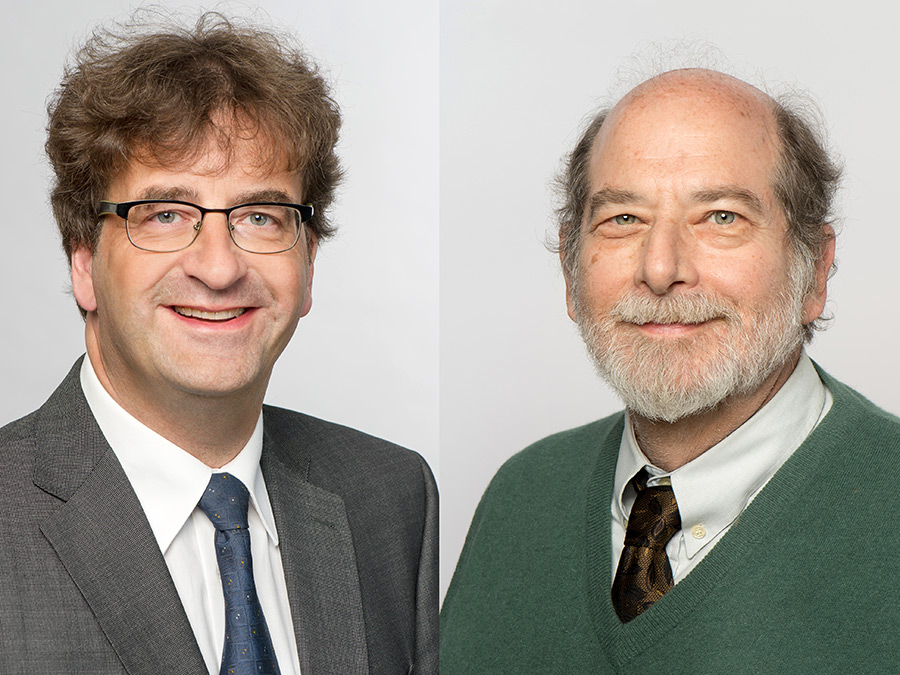An Interview with Prof. Wolfgang Weisser and TUM-Ambassador Prof. Thomas Lewinsohn
Diversity also a plus in science

TUM: How long have you been working together?
Professor Thomas Lewinsohn: Professor Weisser and I had known each other from way back, but we picked up the thread again about five years ago. It started with exchange visits – first, I visited the TUM and Professor Weisser came to UNICAMP, then a postgraduate student and a researcher from TUM came to visit us in Brazil, and later, one of our postgrads went to TUM in Freising. We first went through a trial-and-error process to discover the topics on which we could best collaborate. Based on some experiments performed on plant-eating insects, we mapped out how we could work together on experimental results and data analyses. And then, we were awarded a four-year subsidy for a project from DAAD.
Professor Wolfgang Weisser: At the “Biodiversity Network” TUMBRA, a partnership between TUM and three Brazilian universities, Professor Lewinsohn played a leading role and organized the first workshop on “Theoretical Principles of Sustainable Usage and Protection of Temperate and Tropical Ecosystems” in Campinas in 2012. This network, which in addition to UNICAMP consisted of state universities in Natal, northeastern Brazil and Porto Alegre in the south, was subsidized by DAAD over four years and was very successful in creating close cooperation between Germany and Brazil as well as within Brazil. Professor Lewinsohn is highly interested in teaching ecological principles and has held a leading role in setting up graduate programs. In 2013, we held a workshop in Germany's Bavarian Forest National Park on educational concepts in ecology and, in cooperation with Ms. Spiekermann and colleagues from ProLehre, wrote a nice article on problem-based methods of determining ecological concepts with Professor Lewinsohn as the first author. In the meantime, our cooperation has expanded to cover a range of topics.
Why, in your experience, are cooperative efforts between scientists so helpful despite the approximately 10,000 km separating you from Professor Weisser?
Lewinsohn: You know, our two countries or natural regions are very different from each other, and someone from the outside, with appropriate expertise of course, can often introduce valuable new perspectives. It can be very helpful for scientists to listen to somebody, during the course of their work, who views their topic from a completely different angle. The vertical exchange between young scientists and more experienced ones also contributes a lot. As a rule, it is always good to approach a topic from a certain distance.
Weisser: Brazil is a leader in ecological concepts and approaches to conservation. The conservation of nature is based much more on science there than in Germany, and we can actually learn a lot from them. We cooperate with each other on equal footing, and we have much to gain from each other's perspective. In Brazil for example, it is still very much about protecting wilderness areas and renaturalizing them, and Brazilian scientists are leaders in developing and applying methods for selecting areas to be protected. In Germany, the wilderness has long since disappeared, but we are increasingly involved with sustainable use, such as how to combine production with the conservation of ecosystems. We are also experienced in conserving cultural landscapes; here again Brazilian scientists can gain new insights.
Do you prefer a specific means of collaborating?
Lewinsohn: We get together for brainstorming sessions or systematically go through data. The view from a fresh perspective allows us to come up with new ideas and therefore new projects; it is very productive, particularly for ecological research projects.
Weisser: Casual discussions, over a cup of coffee or a glass of wine, have led to many new ideas. Brazilian scientists are much fonder of discussions and debates than German scientists, and my entire team profits from the exchange. Professor Lewinsohn is quite diversified and has worked in this area for many years; this is very helpful in developing cross references and links. It was, indeed, particularly valuable for our recently published article in “Nature”.
Next to scientists, who else profits from the exchange?
Lewinsohn: For students attending a joint lecture, they can experience a different approach to a scientific topic or hear completely different examples that Professor Weisser would not suggest.
Weisser: For students, listening to a lecture about tropical areas from someone who has actually done research there is a special experience. I have participated in field courses for students in Brazil and would say that my lectures have profited from the experience. On the other hand, I feel that the cooperation with Professor Lewinsohn and other Brazilian scientists has led to significant improvements in our concepts of sustaining biodiversity and the sustainable use of resources. This benefits everyone who makes use of it.
In cooperation with an international team of approximately 40 people, you recently published a major research project in "Nature", and this leads to the following question: Are the results applicable to Brazil?
Lewinsohn: We cannot directly apply the results to Brazil, as the degree of biodiversity is much greater there, and in addition to that, the land ownership structure and economic conditions are completely different. However, we still lack an approach to such an extensive and complex biodiversity field study; therefore, I have come to the conclusion that in Brazil, we need a similar research approach, and we can learn much from Germany's experience about how to develop and conduct such large joint projects.
Additional Information
In decades past, many guest scientists attended the Technical University of Munich for shorter or longer stays. Their expertise and international experience have always enriched the university. Every year the President of TUM honors a group of selected international top-level scientists and Research Alumni with the title of „TUM Ambassador“, in recognition of their services, acknowledging them as representatives of all the TUM Research Alumni in the world.